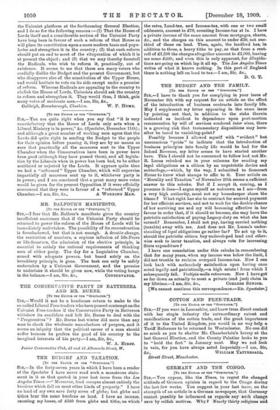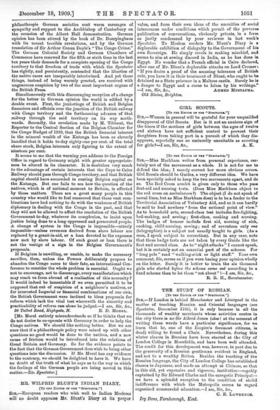GERMANY AND THE CONGO.
[To TILE EDITOR OF TEE " SPECTATOR."] SIR,—You appear, like the Times, to regret the changed attitude of German opinion in regard to the Congo during the last few weeks. You suggest in your last issue, on the strength of an article in a German newspaper, that Germany cannot possibly be influenced as regards any such change save by selfish motives. Why P Nearly thirty religious and
Philanthropic German societies sent warm messages of sympathy and support to the Archbishop of Canterbury on the occasion of the Albert Hall demonstration. German opinion has been stirred by the book of Dr. Doerpinghaus with its recent terrible revelations, and by the German translation of Sir Arthur Conan Doyle's "The Congo Crime." The German Colonial Society and German Chambers of Commerce have renewed for the fifth or sixth time in the last ten years their demands for a complete opening of the Congo territory to that freedom of trade with which the Spectator has rightly, and persistently, contended that the liberties of the native races are inseparably intertwined. And yet these things, instead of being warmly greeted, are received with ungenerous suspicion by two of the most important organs of the British Press.
Simultaneously with this discouraging reception of a change for the better in German opinion the world is edified by a double event. First, the junketings of British and Belgian financiers and officials over the junction of the British railway with Congo territory and the forthcoming advance of that railway through the said territory on its way north- wards. Secondly, the revelation made by M. Tibbaut, the Reporter to the Central Section of the Belgian Chamber for the Congo Budget of 1910, that the British financial interest in the mineral wealth of the Katanga has been so cleverly handled that it holds to-day eighty-one per cent. of the total share stock, Belgian interests only figuring to the extent of nineteen per cent.
It seems to me that the warning you address to the Foreign Office in regard to Germany might with greater appropriate- ness be altered in its character. It is doubtless very much to the advantage of certain interests that the Cape to Cairo Railway should pass through Congo territory, and that British capital should have succeeded in ousting Belgian capital on the Katanga. But one fails to see how the question of the natives, which is of national moment to Britain, is affected by these matters. There are a great many people in this country who would like to feel reassured that these vast com- binations have had nothing to do with the weakness of British diplomacy in dealing with the Congo in the past, and that they will not be allowed to affect the resolution of the British Government to-day, whatever its complexion, to insist upon justice being done to a long oppressed and persecuted people. A change of system in the Congo is impossible—utterly impossible—unless revenues derived from slave labour are replaced by a grant-in-aid, or a loan devoted to the expenses now met by slave labour. Of such grant or loan there is not the vestige of a sign in the Belgian Government's proposals.
If Belgium is unwilling, or unable, to make the necessary sacrifice, then, unless the Powers deliberately propose to abandon the Congo races to their fate, an international Con- ference to consider the whole problem is essential. Ought we not to encourage, not to discourage, every manifestation which may reach us from abroad of a realisation of this necessity P It would indeed be lamentable if we even permitted it to be supposed that out of suspicion of a neighbour's motives, or for interested Imperial or financial combinations of our own, the British Government were inclined to bless proposals for reform which lack the vital teat wherewith the sincerity and practicability of reform can alone be judged.—I am, Sir, &o., 96 Talbot Road, Highgate, N. E. D. Moron, [Mr. Morel entirely misunderstands us if he thinks that we do not desire to co-operate with Germany in order to help the Congo natives. We should like nothing better. But we are sure that if a philanthropic policy were mixed up with other questions no good would be done to the natives, and a new cause of friction would be introduced into the relations of Great Britain and Germany. So far the evidence points to the fact that the German Government does wish to bring other questions into the discussion. If Mr. Morel has any evidence to the contrary, we should be delighted to have it. We have no doubt of the truth of what he says as to the way in which the feelings of the German people are being moved in this matter.—En. Spectator.]



















































 Previous page
Previous page